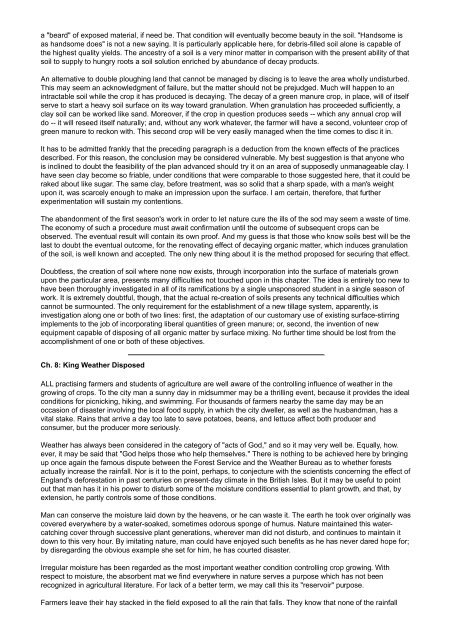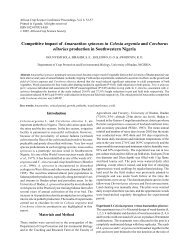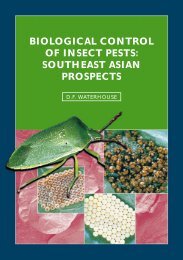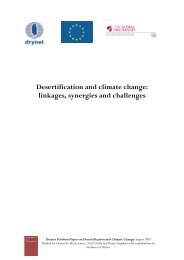Ploughman's Folly Ploughman's Folly - EcoPort
Ploughman's Folly Ploughman's Folly - EcoPort
Ploughman's Folly Ploughman's Folly - EcoPort
Create successful ePaper yourself
Turn your PDF publications into a flip-book with our unique Google optimized e-Paper software.
a "beard" of exposed material, if need be. That condition will eventually become beauty in the soil. "Handsome is<br />
as handsome does" is not a new saying. It is particularly applicable here, for debris-filled soil alone is capable of<br />
the highest quality yields. The ancestry of a soil is a very minor matter in comparison with the present ability of that<br />
soil to supply to hungry roots a soil solution enriched by abundance of decay products.<br />
An alternative to double ploughing land that cannot be managed by discing is to leave the area wholly undisturbed.<br />
This may seem an acknowledgment of failure, but the matter should not be prejudged. Much will happen to an<br />
intractable soil while the crop it has produced is decaying. The decay of a green manure crop, in place, will of itself<br />
serve to start a heavy soil surface on its way toward granulation. When granulation has proceeded sufficiently, a<br />
clay soil can be worked like sand. Moreover, if the crop in question produces seeds -- which any annual crop will<br />
do -- it will reseed itself naturally; and, without any work whatever, the farmer will have a second, volunteer crop of<br />
green manure to reckon with. This second crop will be very easily managed when the time comes to disc it in.<br />
It has to be admitted frankly that the preceding paragraph is a deduction from the known effects of the practices<br />
described. For this reason, the conclusion may be considered vulnerable. My best suggestion is that anyone who<br />
is inclined to doubt the feasibility of the plan advanced should try it on an area of supposedly unmanageable clay. I<br />
have seen clay become so friable, under conditions that were comparable to those suggested here, that it could be<br />
raked about like sugar. The same clay, before treatment, was so solid that a sharp spade, with a man's weight<br />
upon it, was scarcely enough to make an impression upon the surface. I am certain, therefore, that further<br />
experimentation will sustain my contentions.<br />
The abandonment of the first season's work in order to let nature cure the ills of the sod may seem a waste of time.<br />
The economy of such a procedure must await confirmation until the outcome of subsequent crops can be<br />
observed. The eventual result will contain its own proof. And my guess is that those who know soils best will be the<br />
last to doubt the eventual outcome, for the renovating effect of decaying organic matter, which induces granulation<br />
of the soil, is well known and accepted. The only new thing about it is the method proposed for securing that effect.<br />
Doubtless, the creation of soil where none now exists, through incorporation into the surface of materials grown<br />
upon the particular area, presents many difficulties not touched upon in this chapter. The idea is entirely too new to<br />
have been thoroughly investigated in all of its ramifications by a single unsponsored student in a single season of<br />
work. It is extremely doubtful, though, that the actual re-creation of soils presents any technical difficulties which<br />
cannot be surmounted. The only requirement for the establishment of a new tillage system, apparently, is<br />
investigation along one or both of two lines: first, the adaptation of our customary use of existing surface-stirring<br />
implements to the job of incorporating liberal quantities of green manure; or, second, the invention of new<br />
equipment capable of disposing of all organic matter by surface mixing. No further time should be lost from the<br />
accomplishment of one or both of these objectives.<br />
Ch. 8: King Weather Disposed<br />
ALL practising farmers and students of agriculture are well aware of the controlling influence of weather in the<br />
growing of crops. To the city man a sunny day in midsummer may be a thrilling event, because it provides the ideal<br />
conditions for picnicking, hiking, and swimming. For thousands of farmers nearby the same day may be an<br />
occasion of disaster involving the local food supply, in which the city dweller, as well as the husbandman, has a<br />
vital stake. Rains that arrive a day too late to save potatoes, beans, and lettuce affect both producer and<br />
consumer, but the producer more seriously.<br />
Weather has always been considered in the category of "acts of God," and so it may very well be. Equally, how.<br />
ever, it may be said that "God helps those who help themselves." There is nothing to be achieved here by bringing<br />
up once again the famous dispute between the Forest Service and the Weather Bureau as to whether forests<br />
actually increase the rainfall. Nor is it to the point, perhaps, to conjecture with the scientists concerning the effect of<br />
England's deforestation in past centuries on present-day climate in the British Isles. But it may be useful to point<br />
out that man has it in his power to disturb some of the moisture conditions essential to plant growth, and that, by<br />
extension, he partly controls some of those conditions.<br />
Man can conserve the moisture laid down by the heavens, or he can waste it. The earth he took over originally was<br />
covered everywhere by a water-soaked, sometimes odorous sponge of humus. Nature maintained this watercatching<br />
cover through successive plant generations, wherever man did not disturb, and continues to maintain it<br />
down to this very hour. By imitating nature, man could have enjoyed such benefits as he has never dared hope for;<br />
by disregarding the obvious example she set for him, he has courted disaster.<br />
Irregular moisture has been regarded as the most important weather condition controlling crop growing. With<br />
respect to moisture, the absorbent mat we find everywhere in nature serves a purpose which has not been<br />
recognized in agricultural literature. For lack of a better term, we may call this its "reservoir" purpose.<br />
Farmers leave their hay stacked in the field exposed to all the rain that falls. They know that none of the rainfall






